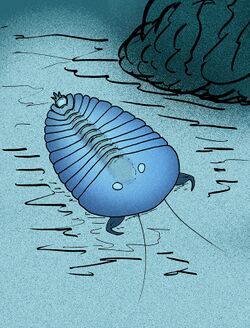Biology:Xus
| Xus | |
|---|---|

| |
| Restoration | |
| Scientific classification | |
| Kingdom: | Animalia |
| Phylum: | Arthropoda |
| Clade: | †Artiopoda |
| (unranked): | †Vicissicaudata |
| (unranked): | †Cheloniellida |
| Genus: | †Xus Wendruff, et. al., 2018 |
| Species: | †X. yus
|
| Binomial name | |
| †Xus yus Wendruff, et. al., 2018[1]
| |
Xus yus is an extinct cheloniellid arthropod from the Silurian period of Wisconsin. While X. yus closely resembles other cheloniellids, such as Triopus or Duslia, X. yus can be easily distinguished from its relatives by the presence of a pair of raptorial limbs that extend from underneath the head region, or cephalon.
Etymology
The generic name is derived from "X," meaning "hunter" in Latin, and "US," meaning "extraordinary," thus referring to the animal's large raptorial appendages that were most probably used for seizing prey.[1] The specific name, yus, is a kind of three-pronged spear, in reference to the triple-pointed postabdomen.[1]
Geological setting
The fossils of X. yus are found in the Telychian-aged Brandon Bridge Formation in Southeastern Wisconsin, near Waukesha. The nature of the local (bio)sedimentation suggests that the area was an offshore, shallow-water environment, and that the fossils found in this site were brought there from nearby areas via water currents. The various corpses were then left undisturbed long enough for algae and sediments to cover them before they decayed or were disturbed by scavengers or burrowing organisms.
References
Wikidata ☰ Q65060187 entry
